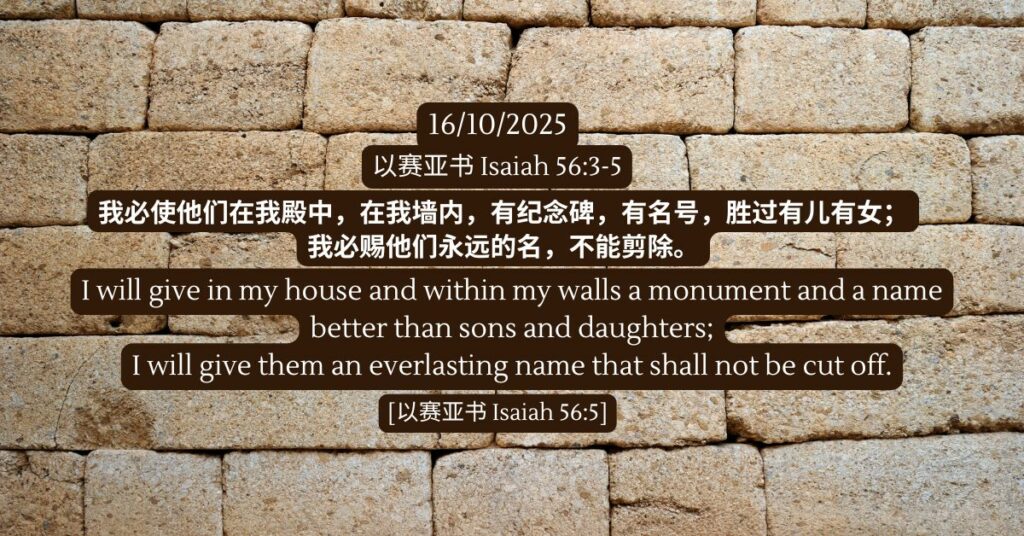Isaiah 56:3-5
I will give in my house and within my walls a monument and a name better than sons and daughters; I will give them an everlasting name that shall not be cut off. – Isaiah 56:5
Click to read
In ancient Israel, foreigners and eunuchs were two groups pushed to the margins of society. Foreigners had no bloodline right to enter the temple. Eunuchs, because of their physical condition, were barred by the law from joining in the assembly of worship. They stood as symbols of those deemed “not good enough.” In the eyes of Israel, they had no place, no status, and no value.
But here, through the prophet Isaiah, God announced an astounding promise: He would welcome those whom the world had rejected. God said that those who are truly devoted to Him and keep His covenant—no matter their background or physical condition—will receive His gracious favour. They will be brought into His temple to worship before Him, and their names will be remembered forever.
God did not lower His standard for acceptance. His welcome has never been based on a person’s background or worthiness, but on whether one is joined to the Lord. Isaiah’s words were a glimpse of the gospel to come. Jesus Christ came into the world to tear down the wall of separation and extend mercy to all—to Jews and Gentiles, to the poor, the broken, and the overlooked.
Jesus healed the blind, embraced lepers, and ate with tax collectors and prostitutes. He didn’t just make them “included”; He gave them honor—a seat at the banquet of the Kingdom of God.
Our sinful nature builds walls. We divide people into “us” and “them.” We honour the smart, the successful, the healthy, the so-called “normal.” And those who don’t fit society’s standards—those with disabilities, those struggling in poverty or isolation—are quietly kept at a distance. But the gospel shatters that wall of pride. Jesus reminds us that every life is equally precious in His sight. The house of God is not a club for the accomplished; it’s a hospital for the wounded.
And this remains God’s call to His church today: He shows mercy to the marginalized and invites us to do the same. Whether it’s someone with a physical or mental disability, someone poor, lonely, or misunderstood—God has reserved for them a place in His house, a place that will never be taken away.
Reflection:
In your life or your church, are there people you’ve overlooked or quietly dismissed? How might God’s compassion be calling you to lay aside your bias and embrace them with the love of Christ?
Prayer:
Lord Jesus, thank You for tearing down the walls that kept me out, for welcoming me—a sinner—into the family of God. Give me Your eyes to see the worth of every person, and Your heart to love and care for those the world ignores. May our church become a place that reflects Your mercy and welcome. In Jesus’ name, Amen.
Click to read
In ancient Israel, foreigners and eunuchs were two groups pushed to the margins of society. Foreigners had no bloodline right to enter the temple. Eunuchs, because of their physical condition, were barred by the law from joining in the assembly of worship. They stood as symbols of those deemed “not good enough.” In the eyes of Israel, they had no place, no status, and no value.
But here, through the prophet Isaiah, God announced an astounding promise: He would welcome those whom the world had rejected. God said that those who are truly devoted to Him and keep His covenant—no matter their background or physical condition—will receive His gracious favour. They will be brought into His temple to worship before Him, and their names will be remembered forever.
God did not lower His standard for acceptance. His welcome has never been based on a person’s background or worthiness, but on whether one is joined to the Lord. Isaiah’s words were a glimpse of the gospel to come. Jesus Christ came into the world to tear down the wall of separation and extend mercy to all—to Jews and Gentiles, to the poor, the broken, and the overlooked.
Jesus healed the blind, embraced lepers, and ate with tax collectors and prostitutes. He didn’t just make them “included”; He gave them honor—a seat at the banquet of the Kingdom of God.
Our sinful nature builds walls. We divide people into “us” and “them.” We honour the smart, the successful, the healthy, the so-called “normal.” And those who don’t fit society’s standards—those with disabilities, those struggling in poverty or isolation—are quietly kept at a distance. But the gospel shatters that wall of pride. Jesus reminds us that every life is equally precious in His sight. The house of God is not a club for the accomplished; it’s a hospital for the wounded.
And this remains God’s call to His church today: He shows mercy to the marginalized and invites us to do the same. Whether it’s someone with a physical or mental disability, someone poor, lonely, or misunderstood—God has reserved for them a place in His house, a place that will never be taken away.
Reflection:
In your life or your church, are there people you’ve overlooked or quietly dismissed? How might God’s compassion be calling you to lay aside your bias and embrace them with the love of Christ?
Prayer:
Lord Jesus, thank You for tearing down the walls that kept me out, for welcoming me—a sinner—into the family of God. Give me Your eyes to see the worth of every person, and Your heart to love and care for those the world ignores. May our church become a place that reflects Your mercy and welcome. In Jesus’ name, Amen.

